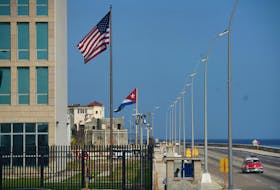GEOFF IRVINE
GUEST OPINION
Much has been written about the ongoing challenge of protecting the North Atlantic right whale (NARW) along the Eastern seaboard of the U.S. and in the Gulf of Saint Lawrence. The impact the 18 reported deaths in 2017 has had on the entire NARW population cannot be understated.
The issue in many cases has been a lack of substantiated facts with regards to specific fisheries and the ongoing commitment by key fisheries to protect the NARW.
Canadian lobster fishery is one of those key fisheries that has, until now, remained silent about our role and our ongoing commitment to NARW protection. Our harvesters and processors do what’s needed to ensure a sustainable fishery without fanfare.
With less than an estimated 500 NARW left alive in the world, the deaths last year have prompted the scientific, regulatory, and environmental communities to consider the threats to the species critical, and now a pivotal time to make dramatic changes. The Canadian Department of Fisheries and Oceans has moved quickly to implement several new measures including static and dynamic closure of fishing zones, new requirements around the labeling and management of fishing gear and a requirement to report all interactions with marine mammals.
RELATED: Lobster fishery restrictions imposed to safeguard access to U.S. market: LeBlanc
In the absence of good data, fisheries managers and regulators have been forced to make assumptions on whether the mitigation measures are effective and the full costs of implementation
Canadian lobster harvesters have been at the forefront of implementing key mitigation strategies to protect the NARW long before the high death toll in 2017. That’s because Canadian lobster fishermen have always understood the importance of a balanced and protected ecosystem.
The Canadian lobster fishery is one of the most sustainable in the world. Our ongoing mitigation strategies, our defined lobster seasons and trap limits as well as some of the newly introduced regulations by DFO all help to mitigate the risk to the NARW. Our fishery is committed to NARW protection and has been taking steps long before the devastating mortality rate last year. The industry began developing its own mitigation strategies which included monitoring, self-imposed suspensions and gear tracking as early as 2006.
Lobster harvesters in various Canadian fishing regions are testing new technologies including hydrophone microphones to help pinpoint NARW locations and ropeless gear technology. As well, several harvesters are training with whale rescue teams on whale disentanglement.
We believe that the lobster fishery has been unfairly linked to many whale deaths in Canadian waters without any direct evidence. Of the seven necropsies performed on right whales killed in Canadian waters only two have definitively been linked to entanglement with fishing gear.
We understand that the Government of Canada has implemented measures it believes are the most immediate solution to protecting the NARW and we respect that they needed to implement these measures very quickly to begin to address the situation. We want to work with the government to continue to monitor the effectiveness of all the regulations to ensure they are the best mitigation measures possible to protect the NARW while also recognizing the economic survival of our coastal communities.
As an industry, we are very committed to working with regulators on both sides of the Canada/US border to ensure that we are doing all we can to implement proven mitigation tactics that will have a real impact on the long-term sustainability of the NARW.
We support continued study to better determine the exact cause of NARW mortality. We also urge all stakeholders to consider the impacts on the industry and ultimately the livelihood of the people and communities who are involved in the lobster fishery.
It is critical to remember that the Canadian and Northeast U.S. lobster fisheries are truly integrated and reliant upon each other – making the NARW issue a North American industry issue – not a Canadian or American industry issue. We have been working closely with our US colleagues for generations and continue to work together for the benefit of the entire industry.
Together we’re convinced we can make that happen.
- Geoff Irvine is executive director, Lobster Council of Canada








